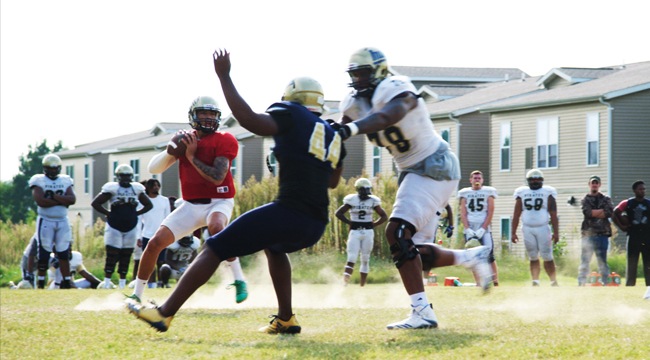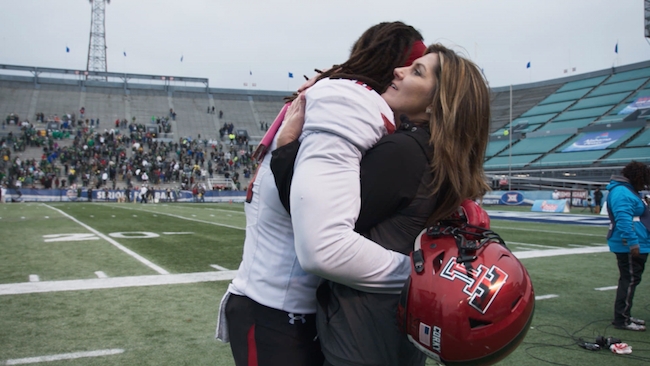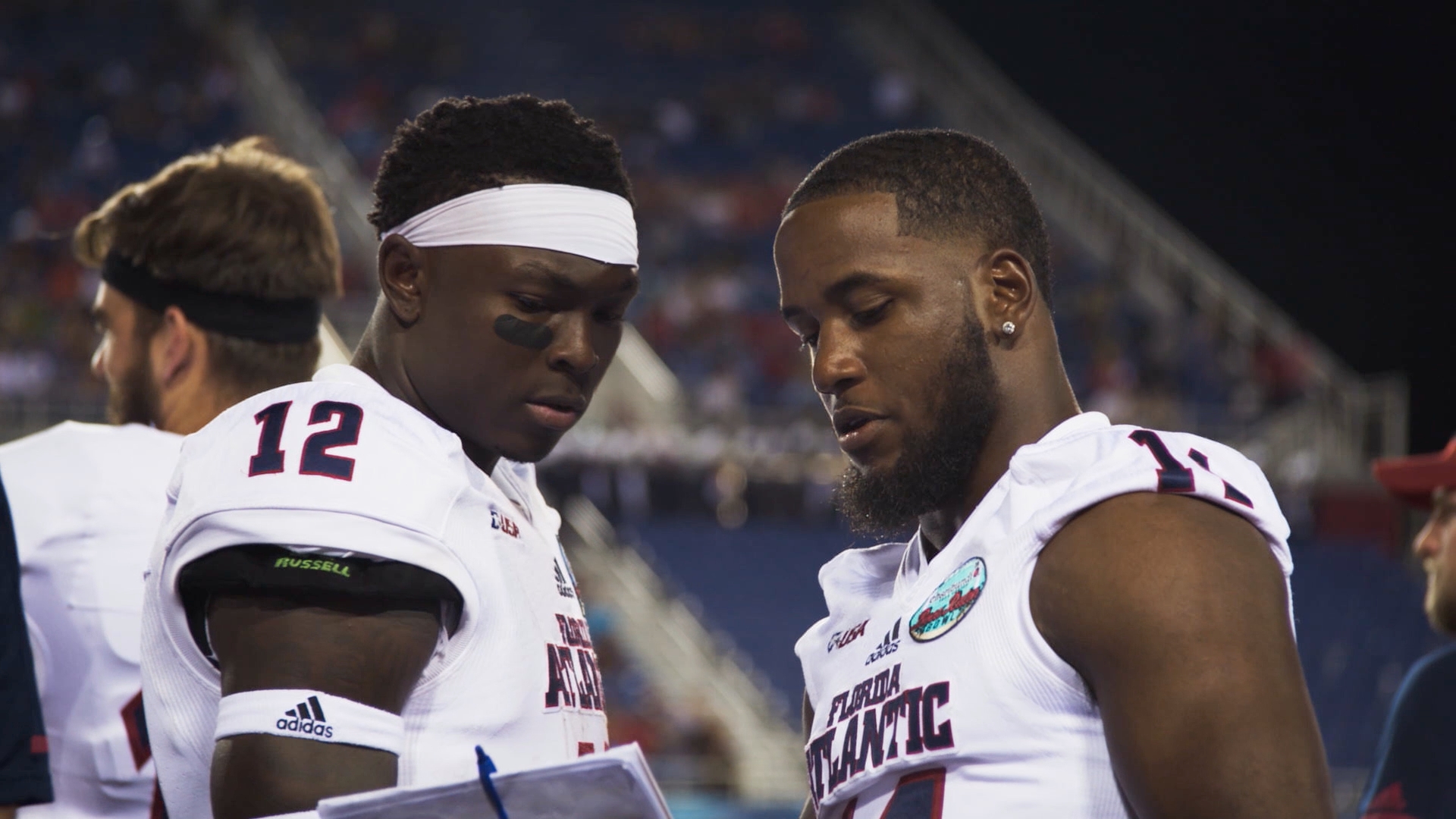
It’s saying something, in this age of social-media-driven immediacy, that some of the most compelling sports TV in recent memory has involved months-old coverage of a college football team you’ve never heard of. Ask anyone who’s seen it; Last Chance U. is just that good.
The first two seasons of the Netflix documentary series followed the football program at East Mississippi Community College, a national JuCo powerhouse loaded with Division I castoffs and a slew of fascinating characters. There’s volatile head coach Buddy Stephens, beloved but overwhelmed academic advisor Brittany Wagner, and the dozen or so players — a mix of hard-luck kids trying to play their way out of poverty and hardheaded kids who can’t seem to get out of their own way — whose stories made the show as immersive as any scripted drama.
When LCU returns this Friday for its third season, it’s with a new cast of characters and a new location. The show has moved on from tiny, isolated Scooba, Miss., to Independence, Kansas, home of Independence Community College. Where EMCC was a national power battling to maintain its place atop the JuCo throne, Indy CC is a long-struggling program making a move to join the elite. As such, Season 3 promises a fresh perspective while adhering to the all-access formula that’s made the show successful.
But the drama at EMCC, which took an unexpectedly serious turn in Season 2, isn’t forgotten: The show’s creators also filmed a follow-up episode on their time in Scooba, updating the stories of Stephens, Wagner, and a handful of players, mostly notably running back Isaiah Wright, whose already difficult life took a particularly tragic turn. We caught up recently with Adam Ridley, a director and producer on the show, to talk about what fans can expect from the new season, why it was time to move on from EMCC, and what he’s learned about the game, and the business, of college football.
UPROXX Sports: Fans of the first two seasons had a lot invested in some of the characters from EMCC. Why did you guys decide not to go back for another season?
Adam Ridley: At the end of Season 2, Brittany Wagner left, and along the way I think there was probably already a mutually unspoken agreement that it was going to be the last year, just because of the element of difficulty that definitely showed up on screen.
It was increasingly clear that Buddy Stephens had lost patience with having you guys around.
Right. We were actually looking to maybe change after the first year, but the way first year ended with the fight [ed. note: EMCC was disqualified from the state playoffs when an on-field brawl marred their final regular-season game], we thought it would be interesting to see how that story would resolve itself. But by the end of Season 2, it seemed like that chapter was closing.

You mention Brittany leaving her job as the team’s academic advisor. It’s hard to imagine the show at EMCC without her.
She was looking to leave — she alluded to it the first year, and definitely that second year she was talking about it quite a bit. I think she had a lot of tension with Buddy, and she felt inhibited in doing a lot of the things she wanted to do because of that. If you asked her, she was looking to go to another school, or go DI herself.
She really was the breakout star of the show — you could see how that exposure might open up opportunities for her.
You’ll see when the wrap-up episode airs, she kind of had an epiphany: “Here I am effecting change on such a small level, and now that I have such a huge platform, I can use that and do it on a national level.” I think her first job after leaving EMCC was for a catering company — she got random offers like that — but she ended up starting her own company doing consulting for schools. And yeah, she got random offers from all kinds of people — she’s living in Scooba, a single mom, finding it very hard to meet somebody.
We’ve already mentioned Buddy, obviously a very good football coach who really struggled to keep his temper in check, and failed in ways that could be pretty destructive.
It’s funny, we had to win them over initially — I think a lot of people still feel this way, but it’s really understanding the difference between a documentary series versus a “reality” series. They were worried we were going to turn it into Duck Dynasty, just a bunch of yokels down here. We really had to convince them we were serious. Buddy was excited by that, like, “Good, we’re going to hear the truth.” Unfortunately for him… (laughs)
Early on, viewers could empathize with him — he acknowledged his faults and tried to better himself — but by the end of Season 2, he’s a really hard guy to root for.
It’s weird, because if you were to sit down with him, he’s the most charming, funny guy. All the yelling, he’s not that way when he’s not doing his job. Unfortunately what happened in Season 1 with the fight, I think the pressure to reform his image in Season 2 was too much for him, because he was sort of portraying who he is: He’s a football coach. I played football in high school, and I didn’t think it was weird the way he was yelling. There were a few moments where I thought it wasn’t the best way to handle things, but not an unusual way for a football coach to react. So I was kind of surprised by the audience reaction.
And you gave him plenty of chances to humanize himself.
We were trying to convince him, “Hey, let us film you with your family, the quiet moments, the moments we know who the real you is,” because the coaching was all we’re getting, but he was just kind of over it. We didn’t want him to be this one-dimensional character, and think that still comes across, but just in the context of him being a coach, not a person outside of that.

The follow-up episode, which you directed, catches viewers up with a number of notable players from the first two seasons — quarterbacks John Franklin and DeAndre Johnson, defensive linemen Ronald Ollie and Tim Bonner, linebacker Dakota Allen — all of whom secured DI rides and enjoyed at least some hope of success. The outlier, and the real heartbreak of the show thus far, is Isaiah Wright, who’s facing a potential murder charge back in Tennessee.
Isaiah’s situation was pretty much what prompted us to do the follow-up episode. We were allowed to film his initial hearing, so we’ve got a lot of that footage, and we interviewed the victim’s family as well. But he was with two people who allegedly murdered somebody, and now he’s in jail awaiting a grand jury hearing to see whether he’s guilty of being an accessory — there’s no charge yet.
But this all happened in his hometown, and he was only back in his hometown because he dropped out of school. Here was a guy, had to go the JuCo route, had offers from West Virginia and Florida State before Season 2, then he got a concussion, he tweaked his ankle, he had conflicts with his head coach, and the only offer he ended up getting was Division II West Georgia. He wasn’t satisfied with that, so he dropped out and was just hanging out at home. And his background, that’s the tragedy of his conflict with Buddy. This is somebody who didn’t really have a family, and there’s this father figure he ultimately felt betrayed by. It’s horrible. It’s definitely the worst outcome of any of the kids.
So you leave a situation you’ve gotten to know really well to drop in on a new program. How different was that, especially now that the show is so well-known?
It was really different. I remember the first year, it was 2015, and Netflix wasn’t quite Netflix yet, so we had to do a lot of work just to get people to trust us, that we weren’t trying be manipulative, or even just to think we were cool, as weird as it sounds. With Independence, it was more that we had to temper people’s expectations. When we first got there, people were mugging for the camera. We had to get people to settle down. It was great that people were eager for us to be there, but it took a few weeks to get to where we were sort of invisible.
The biggest difference — we never really had a huge problem with access at East Mississippi, but there were those moments where we started getting kicked out of meetings, or issues with our boom mics being a distraction. But at Independence, we just had free rein. We could go into any meetings. Coach Jason Brown is just an open book. It wasn’t what we could film, it was what we wanted to film, which is just a god-send for a filmmaker. They’d seen the previous two years, so they knew what we were about.
Did you guys look at other options before choosing Independence? There had to be schools begging you guys to come film their program.
Oh, yeah, we had that. A lot of teams, obviously — you’re a junior college, to be able to use Last Chance U. as a recruiting tool is amazing. We went to Garden City CC in Kansas, which had just won the national championship, and their coach really wanted us to be there, but we couldn’t quite agree on everything with the administration. We went to ASA Brooklyn, which is a for-profit, and we thought that’d be a very interesting setting, but it didn’t quite work out with their schedule. But Independence is this school that had not won anything, ever. We thought that was really intriguing. We went from perennial national champions to a team that had never won a bowl game, they’ve got this new coach from California, they’re starting to put money into their program. Let’s see how it goes.
For them, obviously it was an opportunity to shine light on their program. Also, I think they knew we weren’t trying to, you know, catch a kid smoking weed or skipping class — I think they trusted that we weren’t on the lookout for that, or trying to make that happen. From their mindset, I think biggest thing is they trusted us, and then how big it would be for the program to have a national TV show.
You’ve got a pretty diverse resume — you made a documentary about a nudist piano player, and you worked on another one about Mitt Romney. As a filmmaker, what’s been your big takeaway from working on Last Chance U.?
I’ve learned that there are lot of … I don’t know, it’s hard. I just see football as this carrot dangled in front of people as not the best situation. I’ve learned so much about where a lot of these kids have come from, and they’re not in the best situations, so I totally understand the allure: If you just do this thing and work hard and do the best you can, you can get millions of dollars and get your family out of this situation. But I can’t not be cynical about the business of football. And that’s on top of the whole physical damage you do to your body. How many concussions have we filmed whether we knew it or not? With everything I’ve seen, I can’t help but have a bad taste in my mouth.
Could you guys carry this format with another sport? Could there ever be a Last Chance U. for basketball?
We’ve looked at it. I’d do a basketball version of this in a second. With football, we’ve had no problem finding these guys who should be at the Division I level. That’s not as common in college basketball. And then just from a logistical level, the beauty of football is that every week is one game, and you can infuse so much drama in that. It’s just more difficult from a storytelling perspective with a sport that has 25 or 30 games in a season. But the challenges of doing a show like that would be exciting.
But it’s still football for now, at least for one more season. Do you think viewers will embrace this Independence team?
Oh, yeah, absolutely. I think as far as characters, and as far as the setting, we couldn’t have asked for a better situation. And if they thought Buddy had colorful language, they haven’t seen anything yet.






